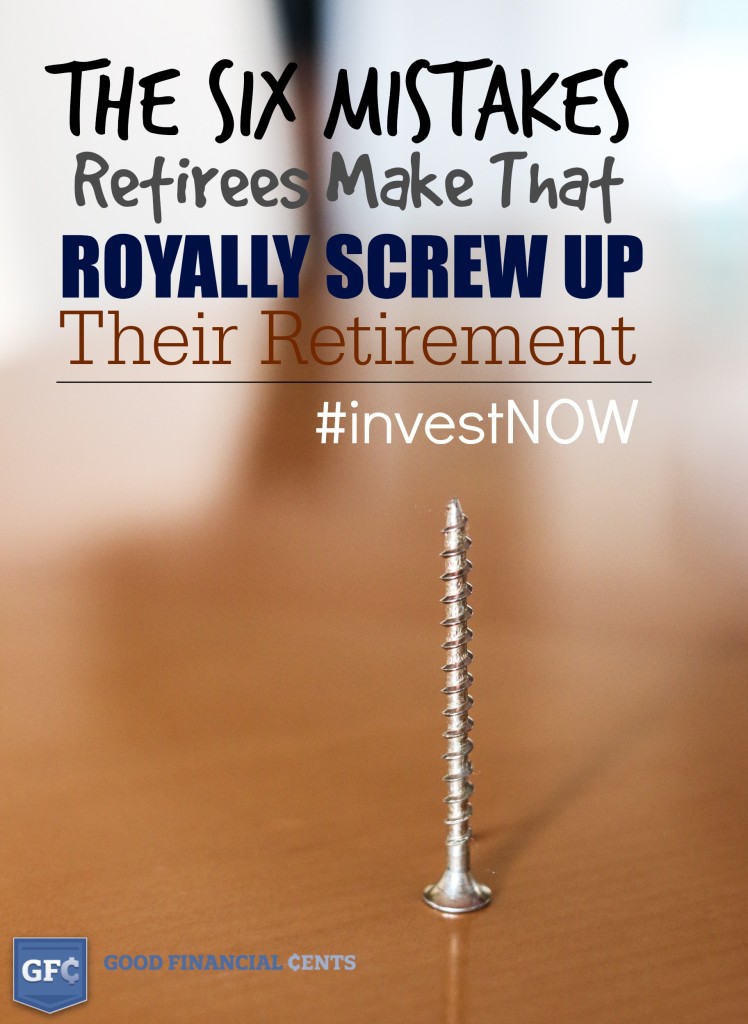No one likes to get screwed.
It’s not a fun feeling, and personally, it irritates the crap out of me.
But what happens when you screw yourself? That’s definitely not cool!
I’ve been a financial advisor for over 12 years now, and I’ve seen plenty of people screw themselves out of a successful retirement.

The most frustrating aspect on my end is that much of it could have been avoided if the person had taken a little bit of time to review their situation.
Fact: More people spend time planning their family vacation than they do preparing for retirement.
Don’t be one of these people.
Table of Contents
Here are the top 6 mistakes that I’ve seen people make to screw up their retirement.
1. They Don’t Have a Specific Goal
I meet with people all the time who want to retire at a certain age. I usually hear something like, “Yeah, I want to retire sometime in my 60’s”. That is fine and dandy, but identifying the age when you want to retire is not even half of it.
- How much do you need when you retire?
- How much have you saved?
- Will your investments have enough to get you enough income to meet your retirement goal?
If you want to retire successfully, you have to have a specific goal in mind.
A better example of a specific retirement goal would be:
“I want to retire at age 62 with $750,000 of investable assets that will yield me approximately $45,000 a year of income, including my pension and social security.”
If you’re familiar with the concept of SMART goals, which is an acronym for Specific, Measurable, Assignable, Realistic, and Time-Related, having a retirement goal is no different. Your goal must be able to meet all of these criteria if you want to retire without having to go back to work.
2. They Focus on What They Wanted to Make Versus What They Needed to Make
If it didn’t look awkward, I would love to bang my head on the desk every time I have a conversation like this:
The client says,
“Jeff, I would like to make a 12% return with my portfolio.”
My response,
“But Mr. and Mrs. Client, by what you demonstrated to me with your income needs, if you only made 4% to 5%, that would be more than enough.”
Client response: Deer in headlights, blank stare.
Me: Biff slaps to the forehead.
I talk to numerous people all the time who are obsessed with how much their portfolio can make and what their friends are making with their investments. How much return your portfolio generates is meaningless and should really have nothing to do with it.
What’s more important is identifying how much more you need to make.
How much income do you need each month to survive? How does that income compare with your other income sources — pensions, social security, et cetera? Stop focusing on the 12% that big-time investors claim to make, and start focusing on what you actually need.
3. They Never Review Their Portfolio.
Confess: When was the last time you actually opened an account statement? When was the last time you actually sat down with your financial advisor and reviewed what is going on with your investments and your 401(k)?
If this has occurred in the last 365 days, congratulations. You are the minority.
Would you believe that I have clients who confess to me they don’t even open their statements? As a financial advisor, I appreciate the trust and confidence they put in me by not opening their statements, but I also chastise them.
You need to know what is going on with your investments. An annual review is a minimum of what you need to do. Twice a year is even better. With technology nowadays providing online access and a gambit of online review tools, there is no reason that you should not have a pulse on what is happening with your investment situation.
If you still do not want to deal with a regular review, you should consider investing with Betterment or Wealthfront. These services are robo-advisors who will take your risk tolerance into account and rebalance your portfolio automatically.
4. They Watch Too Much CNBC.
I personally love it when a client sees some special segment on CNBC that talks about some future crisis. They then want to completely throw out their financial plan and start implementing some risk-hedging strategy that Jim Cramer swears by. If I had the ability to cancel my clients’ cable or satellite service and prevent them from watching CNBC anymore, I would love to do so. (I don’t mean to pick on CNBC here. Insert any major media company here, and the same still applies.)
In good markets or bad markets, letting media headlines influence your investing strategy is a recipe for disaster.
Meet with your financial advisor. Put a financial plan in place. Identify what those specific goals are. It doesn’t matter what CNBC or any other major news outlet says about what is going on in the market. Your financial goals have not changed. Don’t let CNBC change them for you.
5. They Overestimate the Lifespan of Their Portfolio.
At the time of this post, the oldest client that I have is 91 years old. She retired from “Ma Bell,” now AT&T, over 35 years ago.
In fact, she’s actually been in retirement longer than the years that she’s worked, and because of her pension, she has made more retirement than what she was formerly getting as a paycheck each week.
However, she is the exception in that pensions are becoming basically extinct. If you have a similar pension like this, consider yourself lucky. The rest of us are dependent on 401(k)s and social security to be there for us and to last us through our retirement years.
With advances in medicine, people are living longer. In fact, according to the National Institute on Aging, “data on life expectancies between 1840 and 2007 show a steady increase averaging about three months of life per year”
Recently, Fidelity did a study that estimates the average couple will spend more than $315,000 on health care expenses during retirement…yet nearly half of pre-retirees (age 55-64) believe they will only need approximately $50,000.
Here are some more interesting stats found with that study:
- Fidelity estimates an individual with a pre-retirement income of approximately $80,000 and in poor health may need an income replacement ratio as high as 96 percent of his or her pre-retirement income each year, or approximately $76,800.
- That same person in excellent health might need just 77 percent, or $61,600, a nearly 20 percent difference.
- 84 percent of respondents wonder if they will be able to cover health care costs in retirement.
Be prepared to live much longer than you anticipate whenever you finally decide to quit the day job.
6. They Don’t Take Time to Check Their Beneficiaries
One of the saddest stories that I have come across was when I met with one of my three brothers. He was in the process of getting an inheritance from his recently deceased mom. The money that we were working with was with her IRA, but I also learned that she had an annuity that was three times as large as the IRA.
The mom had put a will in place where she had named all three brothers as equal beneficiaries. What she didn’t know, or at least forgot, was that on her annuity, she named the oldest brother the sole beneficiary, even though her will stated that the money would be divided equally between the three. The annuity trumps what the will states, which means the oldest brother got all of the money.
Now, any good sibling would know that Mom wanted the money to be split three ways, so of course, he split it up equally, right?
Wrong.
The oldest brother took the entire $300,000 annuity and used it for his own personal pleasures. In fact, I learned that the brother bought an airplane. Yes, an airplane, with the money. To add insult to injury, the brother at the time didn’t even have a pilot’s license.
What is the lesson learned? Check your beneficiaries. Make sure you review your 401(k)s, your annuities, and your life insurance policies. It takes less than 10 minutes to review all of your policies, so make sure you get it done.
Others Retirement Screw-Ups
What do others think the top retirement screw-up is? I took to Twitter to what others might say:
@jjeffrose Another retirement screwup: failing to annuitize part of their assets (longevity insurance)– even just a cheap SPIA + Soc Sec.
— Doug Nordman (@TheMilitaryGuid) March 18, 2014
@jjeffrose My final retirement screwup: no plan for what they’ll do all day– hobbies, travel, social/family, volunteer, exercise, projects.
— Doug Nordman (@TheMilitaryGuid) March 18, 2014
Thanks to Doug from The Military Guide for adding to the discussion!
Is Your Retirement Plan on Track?
Don’t screw yourself out of successful retirement. Learn more about our process The Financial Success Blueprint, that helps our clients retire with confidence. Check it HERE.








I’m one of the fortunate ones that has a pension plan in place, but who knows what the future holds with that in 20 years when I retire. I really needed a kick in the pants to start a 403(b) plan. That’s on my list of “to-do’s” this year.
Thanks for this! I really need to get my butt into gear. Right now I’m doing the bare minimum and not opening my statements. Bad bad bad news. You’ve definitely given me that extra push to do some serious calculations.
This is a great article!
I wish more people would begin to think about things like retirement earlier in their lives. The power of compounding interest is SO powerful, I look back and wish I’d starting saving sooner! I am 28 now and have been investing for years, but when I think about how powerful the teenage years before I started investing are… all I see is a missed opportunity for $$$$-signs later on!
Love the SMART goal reference too. I’m HUGE on goal setting and a goal that’s not SMART is very difficult to achieve!
Thanks for the great article!
It was an excellent read. Thinking about retirement makes you think that you are getting older. That may be why it is not a popular subject. I think one other problem is that people leave it late to plan for retirement and don’t invest enough in their early years.
Investing in early years is probably the most rewarding when it comes to retirement. We all know the power of compounded returns and value appreciations over the years. When we get older, we say things like if I invested in so on so I would be a rich person by now.
These are all very common mistakes that I have watched people make over the years and it sucks. I love the first one, because if you don’t have your financial goals set in place, you will probably make all of these mistakes! Great article!
Don’t apologize for targeting CNBC, especially Cramer. He’s a menace to any individual investor that watches him. I truly believe that his goal is to help hedge funds take money from retail investors and put it in their own pocket. I honestly don’t know how the man hasn’t landed in jail.
I usually do the opposite of what Cramer says. 🙂 I’ve done pretty well.
You’re welcome, Jeff– unfortunately these mistakes are way too common!